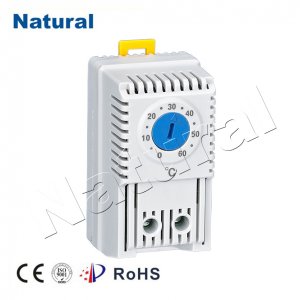In the ever-evolving landscape of industrial automation and manufacturing, precision and control are paramount. Industrial processes demand consistent and accurate temperature regulation to ensure product quality, safety, and efficiency. This is where industrial thermostats come into play, serving as indispensable tools for achieving and maintaining optimal temperatures in a wide range of applications.

The Evolution of Industrial Thermostats Industrial thermostats have come a long way since their inception. In the early days of manufacturing, temperature control was often a manual and labor-intensive task. Technological advancements have revolutionized this aspect of industrial processes. Today, industrial thermostats are sophisticated devices capable of fine-tuning temperatures with remarkable precision. Key Features of Industrial Thermostats Temperature Range:Industrial thermostats are designed to handle a wide temperature range, from sub-zero temperatures to high-temperature industrial processes. This versatility makes them suitable for diverse applications. Accuracy:Precision is crucial in industrial settings. Industrial thermostats are engineered to provide precise temperature control, ensuring that manufacturing processes are consistent and reliable. Remote Monitoring:Many industrial thermostats are equipped with remote monitoring capabilities, allowing operators to oversee and adjust temperature settings from a distance. This feature enhances safety and convenience. Durability:Industrial environments can be harsh, with exposure to dust, moisture, and other contaminants. Industrial thermostats are built to withstand these conditions, ensuring longevity and reliability. Safety Features:To prevent overheating or other potential hazards, industrial thermostats often include safety features such as automatic shut-off mechanisms and alarms. Applications of Industrial Thermostats Industrial thermostats find application in a wide array of industries, playing a pivotal role in ensuring the quality and consistency of products. Here are some notable examples: Chemical Manufacturing:Chemical processes often require precise temperature control to achieve desired reactions. Industrial thermostats are instrumental in maintaining the ideal conditions for these reactions. Food Processing:In the food industry, maintaining specific temperatures during cooking, baking, and food preservation is essential for safety and quality. Industrial thermostats help achieve this. Pharmaceuticals:The pharmaceutical industry relies on industrial thermostats for the production of drugs and vaccines, where temperature control is critical to product efficacy and safety. Automotive Manufacturing:Industrial thermostats play a crucial role in ensuring the proper curing of coatings, adhesives, and paints in automotive manufacturing processes. Environmental Testing:Industries involved in environmental testing and simulation use industrial thermostats to replicate extreme temperature conditions for product testing and development. The Future of Industrial Thermostats As technology continues to advance, industrial thermostats are likely to become even more sophisticated and integrated with automation systems. Predictive maintenance and artificial intelligence algorithms may be employed to optimize temperature control further. Moreover, the drive towards energy efficiency and sustainability will lead to the development of more eco-friendly thermostat solutions. In conclusion, industrial thermostats are unsung heroes in the world of manufacturing and industrial processes. They ensure that products meet quality standards, processes run smoothly, and safety is upheld. As technology continues to evolve, the role of industrial thermostats in modern manufacturing will only become more critical, driving efficiency, precision, and innovation in various industries.